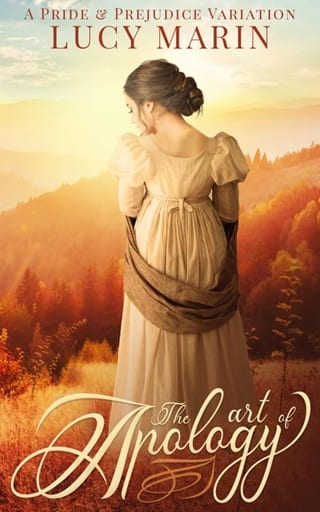Chapter 32
CHAPTER THIRTY-TWO
T he day after they arrived at Gracechurch Street, Mrs Hurst and Miss Bingley called with their brother and Mr Darcy. It was obvious to Elizabeth that the ladies did not want to be in her aunt’s parlour, but Jane had told her that Mr Bingley had insisted they come. They were polite but not warm to Jane, and Miss Bingley spent almost the entire length of their visit staring at Mr Darcy and Elizabeth, who spoke chiefly to each other but without completely overlooking their companions. Mr Bingley whispered an apology to Elizabeth as he was saying his farewell.
“I did not think to explain your connexion to her. She has said she gave up her hopes regarding him long ago, but…”
“Think nothing of it,” Elizabeth said. “I assure you, I shall not.” That was especially true because Mr Bingley was immediately replaced by Mr Darcy, and she was far more interested in enjoying her last moment of the day with him than remembering Miss Bingley .
“I wish we had more time together,” he said.
“As do I.” The Gardiners, Jane, and Elizabeth were engaged to dine with one of Mr Gardiner’s business associates that evening. “Tomorrow.”
“Tomorrow,” he agreed, surreptitiously taking her hand briefly.
They had already arranged that he would take her and Miss Darcy to call on Lady Romsley. Afterwards, she and Miss Darcy would meet Jane and Mrs Gardiner to do some shopping, followed by returning to his house, where Mr Gardiner would join them for dinner.
Once the guests were gone, Jane announced that she would like to return the ladies’ call. “I do not know that we can be friends, but I am determined to be on good terms with them.”
“You might feel you need to bend a little to please Mr Bingley by being amiable towards his sisters, but recall that he loves you as you are,” Mrs Gardiner said. “A successful marriage requires the couple to learn to work well together. You and he will both necessarily change as you establish your life and family, but do not change who you are in an effort to befriend his sisters.”
Fortunately for her, Elizabeth did not need to worry about simply being on good terms with Mr Darcy’s relations. His sister was sweet and already dear to her, and, as she met them, she very much liked the earl and countess, their sons, and Mr Frederick Darcy, his wife, and daughter, who Mrs Darcy hinted was on the point of forming an attachment to a certain viscount of their acquaintance. Lady Romsley arranged a family dinner for them all, including Mr Bingley, Jane, and the Gardiners, so that they might become better acquainted before the ball. During it, Elizabeth had a chance to see Miss Rebecca Darcy and Viscount Bramwell together, and it was apparent they were happiest in each other’s company. She mentioned his cousins’ relationship to Mr Darcy when they were in the drawing room after the meal.
“I do not believe my cousin noticed her a day in her life until last spring, despite having known her since she was a child. Since then, however, he has been trying to earn her regard,” Darcy said. “I believe he is succeeding.”
“It seems as though romance abounds about us.” Their eyes met, and he slipped his hand next to hers on the settee they were sharing.
Leaning towards her and whispering, he said, “I am only interested in one romance. I had not expected we would be so busy.”
“Neither had I. I had thought—hoped—we would have fewer demands on our time, especially after how many we had in Hertfordshire.”
“I am gratified to hear you say that. It matches my sentiments exactly.” He chuckled and added, “I wonder what we might do that would give us the right to insist we be left alone upon occasion.”
“As an unmarried lady and gentleman? Nothing I can think of.”
He ran his hand over his mouth, and his eyes swept over the room, possibly to ensure they would continue not to be disturbed or overheard. Following his gaze, she thought he lingered on Jane and Mr Bingley. She wondered whether he saw the same thing she did: a couple who were not afraid to show the world that they were in love. Elizabeth did not care who knew of her feelings for Mr Darcy—and everyone present was aware of their situation—but she still felt a need to be more secretive about it than Jane and Mr Bingley were, and Mr Darcy was naturally reticent. In thinking of the matter, Elizabeth had decided her reluctance to display her feelings was because she had spent a greater part of their acquaintance dreading hearing people discuss the two of them—both when she was sure she would hate him forever, then as she began to like him more and more.
Turning to her once again, Mr Darcy said, “Have you ever considered how long two people should know each other, how long they should be friends, before they agree to marry? Bramwell and Rebecca have known each other since she was born, yet I do not believe they spent much time with each other until last Easter, as I mentioned. Nine months later, he still has not proposed. Bingley and your sister have liked each other since the day they met, and I imagine he will propose any day. You and I…”
She offered him a smile meant to show that she understood while also encouraging him not to worry about the past. How far she succeeded, she did not know. “You and I met the same night. We were not introduced then, but I still consider it the day we met. As to your question, I think it depends on the people involved, and sometimes, when you know that the other person is the right one for you…you know. ”
He chuckled. “My aunt said something similar to me recently.”
“Is she always so wise?”
He smiled. “She likes you very much, so yes. She told me while we were waiting for you to arrive tonight.”
“I like her too,” Elizabeth said warmly. “I like all your relations, and they have been so welcoming to me, Jane, and my aunt and uncle.”
“You speak too soon. You have not met Lady Catherine or my cousin Anne yet. I suppose Anne is insipid, but there is no real harm in her. My aunt, however, is—I hesitate to use this word anywhere within your hearing—intolerable.”
She laughed. “I would find it impossible to go through life without using the words tolerable and intolerable, so I must demand you not act as though there is something evil about them. As to Lady Catherine, I own I am curious.”
“I pray a meeting between you will be delayed as long as possible. You will understand why.”
During the days leading up to the Twelfth Night ball, Elizabeth’s anticipation became almost unbearable—as did her nerves, though she would never admit the last. It would be a night she remembered for the rest of her life, regardless of whether she ended it an engaged woman, as she thought she might. Oddly, she reflected, she had also expected the Netherfield ball would be a memorable occasion, known in her heart it would be, and she had been correct. How often would she date significant moments in her relationship with Mr Darcy to occasions involving dancing? She sensed he was impatient to propose, and it would be terribly romantic if he did it that night, more so than receiving his offer in the Gardiners’ parlour. To be sure, she would be overjoyed no matter where they were, but she was so happy—more so than she knew she could be—and when he opened his heart to her fully and she could finally tell him how much she loved him, she thought she might burst with delight. More likely, she would cry and laugh at once. In which case, the parlour might be better. I would not want to cause a spectacle, as I surely would by crying and laughing and throwing myself into his arms in a public setting!
The Bingleys’ ball had been an elegant affair, as had been the few she had attended when Netherfield’s owners were in residence, but a ball hosted by an earl and countess would be an entirely different matter. Despite considering herself full of courage, she was nervous. There was no reason for her anxiety; she would be with people she knew, and she had never found it difficult to be amongst crowds. No matter how she tried to talk herself out of it, there was a growing sense that something would go awry that she could not banish despite all her day-dreams of being with Mr Darcy.
The evening began well enough, and she laughed at how silly she had been to worry. Mr Darcy was exceptionally handsome in his evening attire. His blue waistcoat contained thin strands of silver that sparkled in the candlelight, and she was proud to be by his side and for people to see that he favoured her above other ladies. She felt beautiful and desirable, and it had little to do with her gown—which was the loveliest she had ever worn—or the jewels her aunt had lent her. She danced the first set with Mr Darcy, and her subsequent partners were Mr Bingley, Colonel Fitzwilliam, and Viscount Bramwell.
That was when the trouble began.
 Fullepub
Fullepub 



